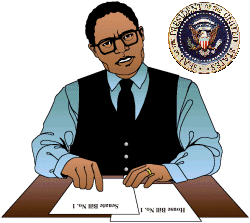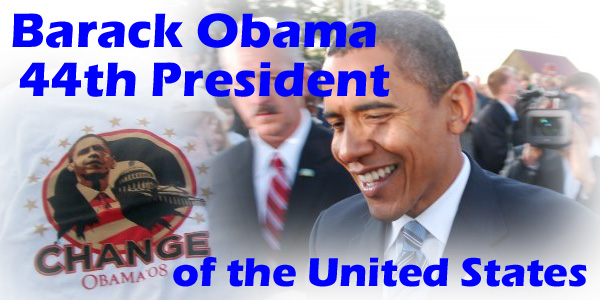 The First Black President: My Nominations
The First Black President: My Nominations(Written 1996-1997)
 The First Black President: My Nominations
The First Black President: My NominationsEpilogue added by Mr. Cassutto, November 16, 2008
What do you think it would be like if we had a black President ?
I think it would be pretty neat. I would nominate Kwesi Mfume first of all because Mfume wants the NAACP to be what he calls "second to none," and I think that is great. Mfume wants to be respected not only by blacks but whites too. He looks forward to setting these goals for the NAACP. Mfume's priority is to enforce civil rights, voter registration and turnout, educational excellence for blacks, economic development, and reach out to young people. I think that Kwesi Mfume would make a great president, and if he would ever reach his goals he would make a big difference.
Another man I would nominate is Jesse Jackson. I would nominate him because of his leadership skills, which has prevented a reduction of the black image in the public eye. As early as 1972, he
was keynote speaker of the Gary, Indiana Black power convention where he urged the formation of a
separate black political party to endorse candidates of both major parties when the black agenda could be furthered. Jackson is the Chairman of the National Rainbow Coalition, and he has become one of America's best known black political figures. Over the
last three years Jackson has played a major role in virtually every movement for empowerment, peace, civil rights, gender equality, and economic and social justice. Jackson has been called the "conscience of the nation" and "the great unifier," calling
America to "make just and human priorities, and bringing people together or common ground across lines of race, class, gender, and belief."
Another black man I would nominate is Colin Powell. I would nominate him because it seems presidents always want Powell on their side. After George Bush won the election in 1988, Powell told Time Magazine, the new president-elect wanted to name him CIA director. Powell did not take the offer, and Bush later chose him to Chair the Joint Chiefs of Staff. As Howard Fineman wrote in Newsweek, Powell "lays out a bland set of conservative principles that would allow him to run either as an independent or as a moderate Republican: low taxes, faith in free enterprise, new scrutiny of entitlements." If the Republican Party had nominated Powell for president in 1996, 51% of American voters would have lean more to him, 41% to Bill Clinton.
Having a black president would be a major change for America. These three black men would be my nominations for a president, and they would all be excellent presidents. If our national racism could be ended, black men and women would have a better chance at being elected president. We saw this trend in 1984 when Jackson led the first significant campaign for President by a black candidate. He made an even better showing in 1988, amassing 6.7 million votes, and finishing second at the Democrat Convention in Atlanta to Micheal Dukakis. There, Jackson brought his message "together we can win" to voters in the crucial New Hampshire primary. From my point of view, if men like Powell and Jackson were not black, they would have already attained the office of president.
Jet Magazine, 11/96 pg.32,
World Book pg.730 1992 edition, "Colin Luther Powell," Volume 15.
Newsweek September 11, 1995, pg. 26.
National Association for the Advancement of Colored People (http://www.naacp.org).

It has been almost two weeks since the election that brought Sen. Barack Obama, Democrat of Illinois, to victory and the height or power -- the presidency of the United States. Obama achieved what has never been done -- convincing the majority white electorate in the United States that his talent and personality is more important than skin color, race, or ethnic background. Obama's father was a black Kenyan, and his mother was a white woman from Kansas, so in effect, he is also America's first bi-racial president (not withstanding all the reports of previous presidents having some African-American heritage).
|
How did now President-Elect
Obama do it? First, the power of his personality, the effectiveness of
his ideas, and the organization of his campaign all combined to show
that he has the traits of not just a good president, but a great
president. Next, at this point in history, the United States is
experiencing severe economic difficulties. A housing industry in the
doldrums, a financial system driven by greed and corruption, dependence
on foreign oil, a massive national debt, trade imbalance, and federal
deficit -- all weigh heavy on the budgets of the average American. Obama
represented a path toward economic relief. He outlined measures that
stand a chance for America's economic direction to be altered and
improved.
Critics might say the American voter just wanted a shift from eight years of the Bush approach to governing, which involved pre-emptive military attacks, massive spending in Iraq and Afghanistan, unfettered free trade, deregulation of key financial industries, and an unrestrained Wall Street, but others might say that Obama stood for a basic shift in American politics, |
| not towards socialism, and his opponent John McCain claimed, but toward a more responsible and effective government. Americans in large numbers rejected the "politics of division" and saw an opportunity for change. That is what Barack Obama represented. | |
When President-Elect Obama takes the oath of office on January 20, 2009, he will bring into reality a dream that was described by Dr. Martin Luther King on the steps of the Lincoln Memorial in 1963. He called for Americans to judge his four little children "not by the color of their skin, but by the content of their character." Obama missed those years of struggle during the Civil Rights Movement; he will be the fourth youngest president to take that office at age 47. But his election extends Dr. King's dream into a reality that many African-Americans never thought they would see become a reality in their lifetime. He symbolizes their progress in American society and the growth that America has experienced in terms of its racial attitudes. There is no doubt much work remains. Racist extremists have been energized and threats against the new president are increasing on a daily basis. We can only pray and trust in God that he will protect the President-Elect and his family so that the tragedies of the loss of our great civil rights leaders such as Martin Luther King and Robert Kennedy not be repeated in America.
The world has celebrated Sen. Obama's victory as a step forward towards the realization of America's democratic ideals. The United States, through the will of its electorate, has demonstrated that it not only espouses the importance of democracy, but, as Dr. King described called for, the nation also "lives out the true meaning of its creed." While we acknowledge President-Elect Obama's victory over racism, we look forward to the day when such a victory does not even need to be part of the American political lexicon.
George Cassutto
November 16, 2008
Teacher, Author, Webmaster
georgecassutto@hotmail.com
|
Teachers:
Visit our sponsor
for Social Studies Materials |